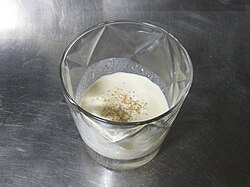History
The drink was first recorded in William Sacheverell's 1688 travelogue of the Scottish isle of Iona. Later accounts attributed its spread, if not its origin, to Aphra Behn. The earliest recorded recipe for milk punch dates to a 1711 cookbook. [4]
Originally served in a punch bowl, early recipes resembled posset and syllabub in the use of curdled, strained cream, leaving only lactic acid. [5] [6] This technique aimed at food stability, [2] a quality that made it popular as a bottled drink. [4] Curdling could be accomplished through the addition of alcohol or acid, by heating, or both, such as in a recipe recorded by Benjamin Franklin in 1763 that used brandy and lemon added to hot milk. [5]
The beverage reached the height of its popularity in the middle of the 18th century. Because of its shelf stability, it was popular as a bottled drink. Queen Victoria issued a royal warrant in 1838 to the company of Nathaniel Whisson as "purveyors of milk punch to Her Majesty". [4]
Milk punch is drunk by Mr Pickwick, Mr Bob Sawyer and Mr Benjamin Allen in Chapter 50 of The Pickwick Papers, while on their way to Tewkesbury.
This page is based on this
Wikipedia article Text is available under the
CC BY-SA 4.0 license; additional terms may apply.
Images, videos and audio are available under their respective licenses.

